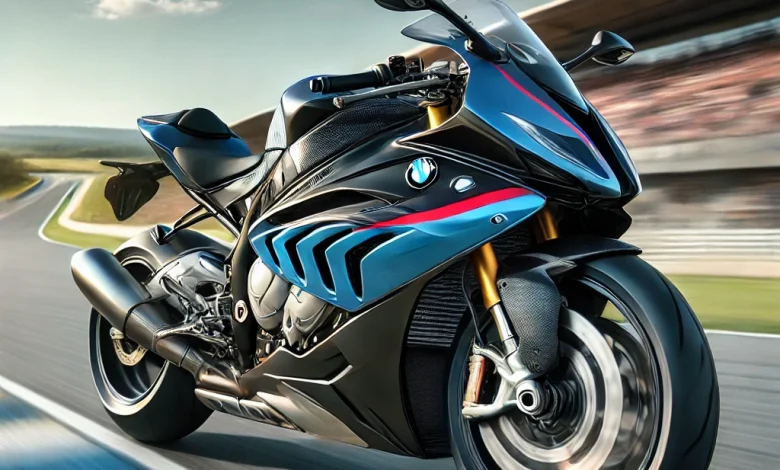BMW Sport Bikes: Top 10 Highlights on Innovation, Performance, and a Sustainable Future

Table of Contents
Introduction
BMW Motorrad has established itself as a dominant force in the motorcycle industry, renowned for innovation, performance, and premium design. Among its diverse portfolio, sport bikes hold a special place, embodying speed, precision, and cutting-edge technology. A sport bike is designed for agility, acceleration, and high-performance riding, qualities that BMW excels in delivering. BMW sport bikes combine engineering excellence and aesthetic appeal, making them favorites among enthusiasts and professionals alike.
History of BMW Sport Bikes
BMW Motorrad’s Beginnings
BMW Motorrad’s journey began in 1923 with the introduction of the BMW R32, setting a benchmark for innovation. Initially focusing on traditional motorcycles, the brand gradually shifted towards sport-oriented designs to meet the growing demand for high-speed, performance-driven bikes.
Evolution of BMW’s Sport Bikes
BMW sport bikes have achieved significant milestones over the years. The iconic BMW K1, launched in 1988, broke new ground with its aerodynamic design. The BMW S1000RR, introduced in 2009, redefined the superbike segment with unprecedented power and advanced technology, becoming a flagship model for the brand.
Technological Innovations Over Time
BMW sport bikes have consistently led in innovation. From pioneering ABS systems in the 1980s to introducing dynamic traction control, BMW has set industry standards. Lightweight materials and aerodynamic advancements further enhance the performance of these machines.
Signature Features of BMW Sport Bikes
Performance-Oriented Engines
BMW sport bikes are powered by exceptional engines, including inline-four and twin-cylinder configurations. These engines deliver impressive power, torque, and top speeds, ensuring a thrilling riding experience.
Advanced Electronics and Technology
Equipped with features like dynamic stability control, quick shifters, and customizable riding modes, BMW sport bikes offer unmatched control and versatility. ConnectedRide technology ensures seamless integration with digital devices, enhancing connectivity on the road.
Superior Handling and Suspension
BMW’s innovative suspension systems, such as Telelever and Duolever, provide superior handling and stability. These technologies contribute to precise cornering and rider confidence, making BMW sport bikes a joy to handle.
Aerodynamics and Design
Aerodynamics play a pivotal role in BMW sport bike performance. Sleek lines, aggressive styling, and innovative fairings not only reduce drag but also create an unmistakable visual identity.
BMW’s Current Sport Bike Lineup
BMW S1000RR
The BMW S1000RR stands out as a leader in the superbike segment, boasting cutting-edge specifications like a 999cc inline-four engine, over 200 hp, and advanced electronic aids. It competes fiercely with global rivals, offering an unrivaled combination of performance and refinement.
BMW M1000RR
The M1000RR represents BMW’s commitment to motorsport excellence. Featuring track-focused enhancements, such as carbon fiber components and aerodynamic winglets, this bike is a testament to BMW’s engineering prowess in high-performance scenarios.
BMW F900R and Other Mid-Range Models
BMW’s mid-range offerings, like the F900R, cater to riders seeking a balance between everyday usability and sport-oriented performance. These models provide versatility without compromising on excitement.
BMW Sport Bikes in Motorsports
BMW’s Presence in Racing
BMW sport bikes have a strong presence in competitive racing, including MotoGP and the World Superbike Championship (WSBK). The brand’s achievements in motorsports underscore its engineering excellence and competitive spirit.
Influence of Motorsports on Consumer Models
Racing technology often finds its way into consumer models. Features like aerodynamic winglets and advanced electronics in BMW sport bikes are direct results of motorsport innovation.
Comparison with Competitors
Key Rivals in the Sport Bike Segment
BMW sport bikes compete with industry giants like Yamaha’s YZF-R1, Kawasaki’s Ninja ZX-10R, and Ducati’s Panigale series.
Strengths of BMW Sport Bikes
BMW sport bikes excel in technology, comfort, and reliability. Their advanced electronic aids and superior handling set them apart in a crowded market.
Areas for Improvement
Despite their strengths, BMW sport bikes face criticism for higher pricing and limited availability in certain markets, areas that warrant attention.
Future of BMW Sport Bikes
Upcoming Models and Innovations
BMW Motorrad is renowned for staying ahead of the curve, and the future of BMW sport bikes looks brighter than ever with a focus on advanced performance, cutting-edge technology, and innovative designs. The brand is expected to unveil updated versions of its flagship models, such as the BMW S1000RR and M1000RR, with incremental improvements in power output, aerodynamics, and rider aids.
BMW is also likely to expand its M-series lineup, introducing track-ready machines with performance features inspired by motorsport engineering. These models may incorporate new materials like carbon composites and titanium to achieve unprecedented levels of lightweight agility. Enhancements in digital displays, AI-driven systems for predictive maintenance, and adaptive riding modes are expected to redefine the riding experience.
Another significant area of innovation is active aerodynamics, where components like winglets and spoilers dynamically adjust based on speed and riding conditions to optimize stability and reduce drag. Integration of augmented reality (AR) technology for navigation and real-time performance feedback is also being explored, potentially revolutionizing how riders interact with their bikes.
Focus on Electric and Hybrid Sport Bikes
As the motorcycle industry shifts towards sustainable mobility, BMW Motorrad is actively investing in electric and hybrid technologies. The Vision DC Roadster concept, revealed in 2019, hinted at what an all-electric BMW sport bike could look like, showcasing a bold design and innovative electric motor layout. While the concept focused on integrating traditional BMW Motorrad styling with modern electric propulsion, the production models will likely prioritize efficiency and performance.
Electric BMW sport bikes will likely feature cutting-edge battery technology, offering faster charging times, extended ranges, and optimized weight distribution for superior handling. Innovations such as swappable battery packs, regenerative braking systems, and advanced cooling solutions will play a vital role in the success of these bikes.
BMW is also exploring hybrid solutions, where small combustion engines work alongside electric motors to deliver high performance while reducing emissions. These hybrid systems could allow for seamless transitions between power sources, giving riders the best of both worlds: the thrill of a roaring engine combined with the quiet efficiency of an electric motor.
Sustainability and Performance Balance
BMW’s focus is not just on creating environmentally friendly bikes but ensuring they remain true to the performance DNA of the brand. Features like instant torque delivery from electric motors, customizable power modes, and enhanced rider connectivity will ensure that even electric and hybrid sport bikes deliver the adrenaline-pumping experience that BMW enthusiasts expect.
Collaborations and Strategic Partnerships
AI Integration and Predictive Systems
To solidify its position at the forefront of the motorcycle industry, BMW Motorrad is actively exploring collaborations and strategic partnerships with technology giants, battery manufacturers, and other automotive innovators. These partnerships aim to accelerate the development of next-generation sport bikes that combine cutting-edge performance with sustainability and advanced rider-focused technology.
One area of focus is artificial intelligence (AI) integration, where partnerships with leading tech companies can enhance the riding experience. AI-assisted systems could enable predictive safety features, such as collision avoidance, adaptive cruise control, and intelligent suspension adjustments. For instance, AI could analyze road conditions and rider inputs in real-time, automatically fine-tuning settings to optimize performance and safety.
Advanced Battery Technology
BMW is also likely to partner with battery technology pioneers to develop lightweight, high-capacity batteries for electric sport bikes. Solid-state batteries, which promise increased energy density and faster charging times, could play a crucial role in reducing weight while improving range and overall performance. Such advancements could allow electric BMW sport bikes to match—or even surpass—the power and endurance of their internal combustion counterparts.
Vehicle-to-Infrastructure Communication
In the realm of vehicle-to-infrastructure (V2I) communication, BMW could collaborate with smart city initiatives and technology providers to enhance connectivity between bikes, traffic systems, and urban infrastructure. V2I systems would allow BMW sport bikes to communicate with traffic lights, road signs, and other vehicles, providing riders with real-time updates on traffic conditions, hazards, and optimal routes. This technology not only enhances safety but also ensures a more efficient and enjoyable riding experience.
Software and Connectivity Solutions
Further collaborations could include software and connectivity solutions, where BMW partners with app developers and cloud service providers. These efforts would expand the capabilities of BMW’s ConnectedRide system, enabling features like remote diagnostics, over-the-air software updates, and integration with wearables such as smart helmets. Riders could benefit from augmented reality (AR) navigation projected onto their helmet visors, live performance analytics, and even AI-generated riding tips based on their habits and terrain preferences.
BMW’s Focus on Sustainable Materials
Advanced Materials for Performance and Sustainability
BMW Motorrad’s commitment to sustainability extends beyond electric and hybrid propulsion systems. The company is expected to collaborate with sustainable material suppliers to revolutionize the construction of its sport bikes, reducing environmental impact while enhancing performance.
One of the key materials BMW is likely to utilize is carbon fiber reinforced polymers (CFRP), known for their exceptional strength-to-weight ratio. While CFRP has already been employed in high-performance models like the BMW M1000RR, future innovations could make its production more sustainable. BMW may work with suppliers to develop recycled or bio-based carbon fibers, reducing the carbon footprint of manufacturing processes. These lightweight materials improve aerodynamics and handling, allowing for faster acceleration and more precise cornering.
Biodegradable Composites
Another area of innovation is the use of biodegradable composites. These materials, derived from renewable sources such as flax, hemp, or other plant-based fibers, can replace traditional plastics in non-structural components like fairings, seat bases, and panels. These biodegradable materials decompose naturally at the end of their lifecycle, minimizing waste and environmental pollution.
Recycled Metals and Emerging Materials
BMW could also integrate recycled aluminum and steel in the construction of bike frames and engine components. Advanced recycling techniques can produce high-quality metals with a significantly lower environmental impact compared to traditional mining and processing. Recycled metals not only reduce resource consumption but also maintain the structural integrity and durability required for high-performance sport bikes.
Additionally, BMW Motorrad may explore the use of graphene, an emerging material that offers superior strength and conductivity while being incredibly lightweight. Graphene-enhanced batteries and composite materials could make future sport bikes more energy-efficient and durable, withstanding extreme stress while delivering unmatched performance.
Eco-Friendly Manufacturing Processes
BMW’s collaborations could also extend to eco-friendly manufacturing processes. For instance, water-based paints and coatings that reduce the emission of volatile organic compounds (VOCs) might be employed to maintain premium aesthetics without harming the environment. Sustainable leather alternatives or plant-based textiles could replace traditional materials in seat upholstery and other trim elements.
Certification and Transparency
To ensure transparency and accountability, BMW may implement certification programs for sustainable materials, collaborating with global organizations to verify the eco-friendliness of their supply chain. These certifications would assure customers that their sport bikes are manufactured responsibly, aligning with growing consumer demand for sustainable products.
By adopting these advanced materials and processes, BMW Motorrad aims to create sport bikes that are not only thrilling and high-performing but also environmentally responsible. These innovations demonstrate BMW’s holistic approach to sustainability, ensuring that future generations can enjoy the excitement of BMW sport bikes without compromising the planet’s health.
Conclusion
BMW Motorrad’s legacy in the motorcycle industry is a testament to its commitment to innovation, performance, and design excellence. From its inception in 1923 with the groundbreaking BMW R32 to its modern-day icons like the S1000RR and M1000RR, BMW has continually redefined the standards for sport bikes. Each era of BMW sport bikes represents a confluence of engineering ingenuity, motorsport heritage, and a focus on rider experience.
One of the defining aspects of BMW’s sport bike lineup is its relentless pursuit of technological advancements. From pioneering anti-lock braking systems (ABS) in motorcycles to introducing dynamic traction control, BMW has consistently led the industry in adopting and innovating rider-focused technologies. These advancements have not only improved performance but also enhanced safety and accessibility for riders of all skill levels. Whether it’s the state-of-the-art electronics in the S1000RR or the lightweight carbon fiber components of the M1000RR, BMW’s sport bikes embody the cutting edge of motorcycle engineering.
The aesthetics of BMW’s sport bikes also play a pivotal role in their appeal. With aerodynamic designs, aggressive styling, and meticulous attention to detail, these bikes are as visually captivating as they are functionally superior. Models like the K1 and the modern S1000RR showcase how BMW integrates form and function to create motorcycles that are not only high-performance machines but also works of art.
Beyond engineering and design, BMW’s involvement in motorsports has been a cornerstone of its success in the sport bike segment. Participation in events like the World Superbike Championship (WSBK) and MotoGP has allowed BMW to test its innovations in the most demanding environments. The lessons learned on the track directly influence consumer models, ensuring that riders benefit from cutting-edge technologies originally developed for professional racing. Features like aerodynamic winglets, advanced suspension systems, and quick-shifter technology exemplify this transfer of knowledge.
Looking to the future, BMW Motorrad is poised to continue its leadership in the sport bike industry. The brand is exploring groundbreaking innovations such as active aerodynamics, artificial intelligence (AI)-driven rider aids, and augmented reality (AR) navigation. These technologies promise to revolutionize the riding experience, offering unparalleled levels of performance, safety, and connectivity. Additionally, BMW’s commitment to sustainability is shaping the future of its sport bikes. With concepts like the Vision DC Roadster and ongoing research into electric and hybrid propulsion systems, BMW is actively addressing the challenges of environmental responsibility without compromising on performance.
Sustainability is not limited to propulsion technologies. BMW is integrating eco-friendly materials such as recycled metals, biodegradable composites, and sustainable textiles into its manufacturing processes. This holistic approach ensures that BMW sport bikes remain true to the brand’s performance heritage while minimizing their environmental impact.
In conclusion, BMW Motorrad’s sport bikes are the epitome of innovation, performance, and sustainability. They embody the brand’s rich heritage while pushing the boundaries of what’s possible in the motorcycle industry. As the world moves towards a more sustainable future, BMW’s sport bikes will continue to offer the perfect blend of adrenaline-pumping performance and environmentally conscious engineering. For riders seeking the ultimate combination of speed, precision, and cutting-edge technology, BMW sport bikes remain the gold standard.
FAQs
1. What makes BMW sport bikes unique compared to competitors?
BMW sport bikes distinguish themselves through a combination of advanced technology, premium design, and exceptional performance. Key features include state-of-the-art electronic aids like dynamic traction control, customizable riding modes, and innovative suspension systems such as Telelever and Duolever. Additionally, BMW’s focus on aerodynamics and lightweight materials ensures a superior riding experience that stands out in a competitive market.
2. Which BMW sport bike is considered the flagship model?
The BMW S1000RR is widely regarded as the flagship model in BMW’s sport bike lineup. With its 999cc inline-four engine producing over 200 horsepower, cutting-edge electronic systems, and aggressive styling, the S1000RR sets a benchmark in the superbike segment. For track enthusiasts, the M1000RR offers an even more performance-oriented experience with enhancements like carbon fiber components and aerodynamic winglets.
3. What role does motorsport play in the development of BMW sport bikes?
Motorsport is integral to BMW Motorrad’s development process. Participation in racing events such as the World Superbike Championship (WSBK) and MotoGP allows BMW to test and refine technologies in high-pressure environments. Many features found in consumer sport bikes—such as advanced aerodynamics, quick shifters, and dynamic suspension systems—are derived directly from racing innovations. This commitment ensures that BMW sport bikes deliver race-proven performance to everyday riders.
4. Does BMW offer electric or hybrid sport bikes?
While BMW has not yet launched a production electric or hybrid sport bike, the Vision DC Roadster concept provides a glimpse into the brand’s electric future. This concept showcases bold design elements and innovative electric motor layouts, hinting at the possibilities for future models. BMW is actively investing in electric and hybrid technologies, focusing on battery efficiency, lightweight construction, and high-performance capabilities.
5. What are some of the most notable innovations in BMW sport bikes?
BMW has introduced numerous industry-leading innovations over the years. Key advancements include:
- Anti-Lock Braking Systems (ABS): First introduced in the 1980s, enhancing safety and control.
- Dynamic Traction Control (DTC): Provides optimal grip and stability across various riding conditions.
- Quick Shifter Technology: Allows seamless gear changes without using the clutch.
- Active Aerodynamics: Components like winglets dynamically adjust to improve stability and reduce drag.
- ConnectedRide Technology: Integrates digital devices for enhanced connectivity and navigation.
6. What sustainable practices is BMW Motorrad adopting in its sport bikes?
BMW Motorrad is committed to sustainability in both manufacturing and product design. Key initiatives include:
- Use of Recycled Materials: Incorporating recycled metals and plastics to reduce environmental impact.
- Biodegradable Composites: Utilizing plant-based materials for non-structural components.
- Sustainable Manufacturing Processes: Employing water-based paints and eco-friendly coatings.
- Advanced Battery Technologies: Developing lightweight, high-capacity batteries for future electric models.
7. What can we expect from the future of BMW sport bikes?
The future of BMW sport bikes will be defined by innovation and sustainability. Upcoming advancements include:
- Active Aerodynamics: Winglets and spoilers that adjust dynamically based on speed and conditions.
- AI-Driven Rider Aids: Systems for predictive maintenance, adaptive suspension, and collision avoidance.
- Augmented Reality (AR): Helmet-integrated displays for navigation and performance feedback.
- Electric and Hybrid Models: High-performance bikes with advanced battery systems and hybrid propulsion.
- Sustainable Materials: Greater use of recycled, biodegradable, and lightweight materials.
8. How does BMW ensure rider safety on its sport bikes?
BMW incorporates a range of safety features to protect riders, including:
- ABS Pro: Optimized braking performance even during cornering.
- Dynamic Stability Control (DSC): Maintains stability in challenging conditions.
- Riding Modes: Customizable settings for various terrains and preferences.
- Electronic Suspension Adjustment (ESA): Adapts suspension to improve handling and comfort.
- Advanced Lighting Systems: LED headlights and adaptive lighting for better visibility.
9. What are the primary challenges facing BMW sport bikes in the market?
While BMW sport bikes are renowned for their quality and performance, they face challenges such as:
- Higher Price Points: Premium features and materials make BMW sport bikes more expensive than some competitors.
- Limited Availability: Certain models may be difficult to access in specific markets.
- Competition: Rivals like Yamaha, Kawasaki, and Ducati offer strong alternatives in the sport bike segment.
10. Are BMW sport bikes suitable for beginners?
BMW sport bikes are designed primarily for experienced riders, but the brand offers models suitable for intermediate and novice riders. For instance, the BMW F900R provides a balance of everyday usability and sport-oriented performance, making it a good option for less experienced riders. Additionally, features like riding modes and dynamic traction control can enhance confidence for those new to sport bikes.
11. What collaborations is BMW pursuing for future sport bike innovations?
BMW Motorrad is actively exploring partnerships with technology companies, battery manufacturers, and smart city initiatives. Potential collaborations include:
- AI Development: Partnering with tech firms to create predictive safety systems and intelligent rider aids.
- Battery Technology: Working with pioneers in solid-state and fast-charging batteries.
- Connectivity Solutions: Expanding the capabilities of ConnectedRide through collaborations with app developers and cloud service providers.
- Sustainable Materials: Partnering with suppliers of eco-friendly and recycled materials for bike construction.
12. What is BMW’s approach to balancing performance and sustainability?
BMW is committed to maintaining its performance heritage while embracing sustainable practices. By integrating lightweight materials, advanced aerodynamics, and efficient propulsion systems, BMW ensures that its sport bikes deliver both environmental responsibility and thrilling performance. Electric and hybrid models will feature instant torque delivery, customizable power modes, and cutting-edge connectivity, preserving the excitement BMW riders expect.
13. How does BMW cater to track enthusiasts?
BMW offers track-focused models like the M1000RR, equipped with features such as:
- Carbon Fiber Components: For reduced weight and improved agility.
- Aerodynamic Winglets: To enhance downforce and stability at high speeds.
- Track-Optimized Electronics: Including launch control, quick shifters, and data logging systems.
14. What role does design play in BMW sport bikes?
Design is a cornerstone of BMW sport bikes, blending aesthetics with functionality. Sleek lines, aggressive fairings, and bold color schemes contribute to their visual appeal, while aerodynamic elements improve performance. Every design detail is meticulously crafted to reflect BMW’s commitment to excellence.
15. How does BMW ensure a premium rider experience?
BMW sport bikes are equipped with features like:
Connectivity Features: Seamless integration with smartphones and GPS systems.
Ergonomic Designs: For rider comfort during long journeys.
Adjustable Components: Such as handlebars, footrests, and seats.
Advanced Displays: High-resolution TFT screens for clear and intuitive controls.



